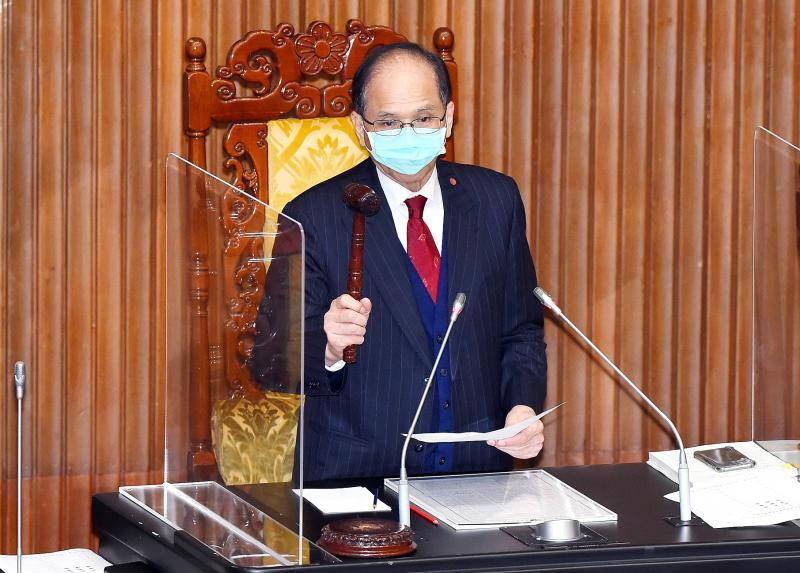Drunk drivers and their passengers are to face stricter fines and penalties after the Legislative Yuan yesterday passed proposed amendments to the Criminal Code and the Road Traffic Management and Penalty Act (道路交通管理處罰條例).
Lawmakers across party lines agreed to mete out heavier penalties to drunk drivers after a series of deaths caused by accidents involving driving under the influence since the end of last year.
The amendment to Article 185-3 of the Criminal Code stipulates that drunk drivers who do not cause accidents or casualties can be sentenced to up to three years in prison, and fined up to NT$300,000 (US$10,832).

Photo: Liao Chen-huei, Taipei Times
The current penalty is a jail term of up to two years and a fine of up to NT$200,000.
The amendment does not change sentences for drunk drivers leading to deaths or injuries, but it allows judges to impose an additional fine of up to NT$1 million if the offense causes serious physical injuries, or NT$2 million for causing death.
The current penalty for deaths caused by drunk driving is a jail sentence of three to 10 years, while injuries could incur a sentence of one to seven years.
The amendment to the road traffic management act defines a repeat drunk-driving offender as one who commits the offense more than once within 10 years, up from five years.
Repeat drunk-driving offenders causing deaths are to be fined up to NT$3 million, in addition to being sentenced to five years to life in prison. An additional fine of up to NT$2 million are to be imposed on drunk drivers causing serious injuries, aside from being sentenced to three to 10 years in prison.
Armed forces personnel who drive under the influence without causing deaths or injuries can be sentenced to up to three years in prison and fined up to NT$400,000, following an amendment to the Article 54 of the Criminal Code of Armed Forces.
The amendment also stipulates that military personnel who are repeat drunk-driving offenders are to be sentenced to five years to life in prison, and fined up to NT$3.2 million if the offense causes death.
The amendment to the road traffic management act also allows the Directorate-General of Highways to make public a repeat drunk driver’s name and photograph, along with the offense committed.
The amendment states that people aged 18 or older can be fined NT$3,000 to NT$15,000 for being a passenger of a drunk driver, up from the current fine of NT$600 to NT$3,000.
However, the fine is to be waived for bus passengers, people aged 70 or older, and mentally challenged individuals, the amendment says.
Fines for intoxicated motorists or motorcyclists would be higher if they have been clearly informed by vehicle renters that they must not drive cars or ride motorcycles under the influence of alcohol or addictive drugs, it says.
The amendment also raises the fine for drunk drivers who do not have alcohol interlocks on their vehicles after regaining their driver’s license to NT$60,000 to NT$120,000, from the current NT$6,000 to NT$12,000.
After retaking a driver’s license test and passing it, offenders would have their driver’s license returned after registering an interlock-equipped vehicle at a motor vehicle office, it says.

Left-Handed Girl (左撇子女孩), a film by Taiwanese director Tsou Shih-ching (鄒時擎) and cowritten by Oscar-winning director Sean Baker, won the Gan Foundation Award for Distribution at the Cannes Critics’ Week on Wednesday. The award, which includes a 20,000 euro (US$22,656) prize, is intended to support the French release of a first or second feature film by a new director. According to Critics’ Week, the prize would go to the film’s French distributor, Le Pacte. "A melodrama full of twists and turns, Left-Handed Girl retraces the daily life of a single mother and her two daughters in Taipei, combining the irresistible charm of

A Philippine official has denied allegations of mistreatment of crew members during Philippine authorities’ boarding of a Taiwanese fishing vessel on Monday. Philippine Bureau of Fisheries and Aquatic Resources (BFAR) spokesman Nazario Briguera on Friday said that BFAR law enforcement officers “observed the proper boarding protocols” when they boarded the Taiwanese vessel Sheng Yu Feng (昇漁豐號) and towed it to Basco Port in the Philippines. Briguera’s comments came a day after the Taiwanese captain of the Sheng Yu Feng, Chen Tsung-tun (陳宗頓), held a news conference in Pingtung County and accused the Philippine authorities of mistreatment during the boarding of

88.2 PERCENT INCREASE: The variants driving the current outbreak are not causing more severe symptoms, but are ‘more contagious’ than previous variants, an expert said Number of COVID-19 cases in the nation is surging, with the Centers for Disease Control (CDC) describing the ongoing wave of infections as “rapid and intense,” and projecting that the outbreak would continue through the end of July. A total of 19,097 outpatient and emergency visits related to COVID-19 were reported from May 11 to Saturday last week, an 88.2 percent increase from the previous week’s 10,149 visits, CDC data showed. The nearly 90 percent surge in case numbers also marks the sixth consecutive weekly increase, although the total remains below the 23,778 recorded during the same period last year,

The Chinese Communist Party (CCP) is pushing for residents of Kinmen and Lienchiang counties to acquire Chinese ID cards in a bid to “blur national identities,” a source said. The efforts are part of China’s promotion of a “Kinmen-Xiamen twin-city living sphere, including a cross-strait integration pilot zone in China’s Fujian Province,” the source said. “The CCP is already treating residents of these outlying islands as Chinese citizens. It has also intensified its ‘united front’ efforts and infiltration of those islands,” the source said. “There is increasing evidence of espionage in Kinmen, particularly of Taiwanese military personnel being recruited by the